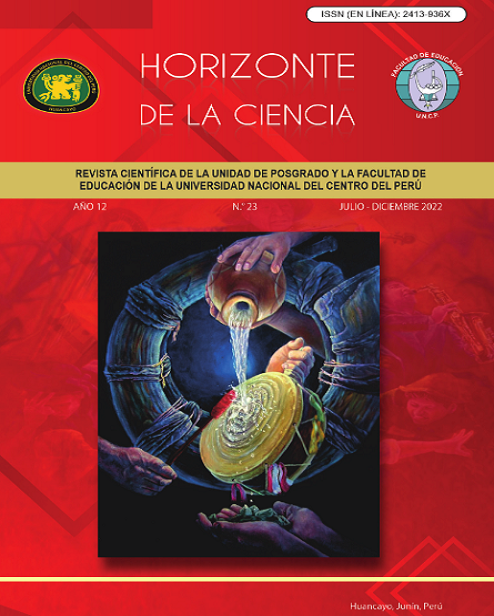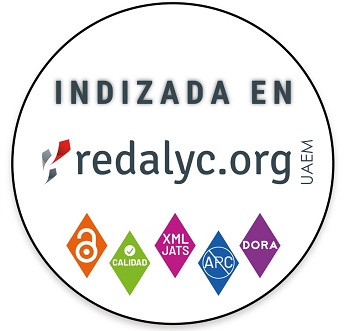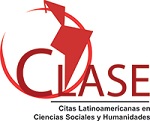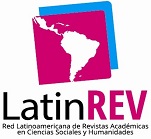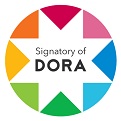Attachment in Times of Pandemic: a Look From Kindergarten Teachers
DOI:
https://doi.org/10.26490/uncp.horizonteciencia.2022.23.1468Keywords:
secure attachment, teacher, strategies, kidsAbstract
This study approaches the topic of secure attachment during the times of pandemic and aims to analyse how the strengthening of the attachment is promoted in early years children from 3 to 5 years old during time of pandemic. Therefore, a methodological design with a qualitative approach was carried out. Three categories were established, which arose theoretically from the subject of study. These are the resources and strategies on attachment; attachment in the formation of boys and girls; and parental work. Based on the above, an eight-question interview was posed for six early years teachers. Finally, it was pointed out that attachment is essential for the integral development of infants, since it will allow them to express themselves emotionally and explore their environment freely, which will help them during the conjuncture.
Downloads
References
Armijos, C. (2015). El apego en el desarrollo social de niños y niñas de educación inicial de la unidad educativa “República de Francia” de la Parroquia Río Verde, ciudad de Santo Domingo, provincia Santo Domingo de los Tsáchilas [Tesis de licenciatura, Universidad Técnica de Ambato, Ecuador]. Repositorio digital, Universidad Técnica de Ambato. https://repositorio.uta.edu.ec/bitstream/123456789/19923/1/Armijos%20Granda%20Carmita%20Del%20Roc%C3%ADo.pdf
Ávila Espada, A. (2020). El psicoanálisis relacional y la teoría del apego. Clínica e Investigación Relacional, 14(1), 45-61. DOI. 10.21110/19882939.2020.140102
Assunção, M., & Gago, M. (2020). Teacher education in times of COVID-19 pandemic in Portugal: national, institutional and pedagogical responses. Journal of Education for Teaching, 46(4), 507-516.
Bosoer, E., Paolicchi, G., & Kohan, A. (2015). Juego, apego y aprendizaje en la Institución Escolar. Anuario de Investigaciones, 22, 305-312. https://www.redalyc.org/pdf/3691/369147944073.pdf
Bustamante, A. (2016). Representaciones de apego, seguridad del apego y problemas de conducta en niños preescolares. [Tesis de licenciatura, Pontificia Universidad del Perú]. Repositorio Digital de Tesis y Trabajos de Investigación PUCP. http://tesis.pucp.edu.pe/repositorio/handle/20.500.12404/7711
Cantón, J., Cortés, M. & Cantón-Cortés, D. (2010). Apego, seguridad en el sistema familiar y actitudes ante la vida. International Journal of Developmental and Educational Psychology, 2(1), 251-25/8. https://www.redalyc.org/articulo.oa?id=3498/349832325025
Garbe, A., Ogurlu, U., Logan, N., & Cook, P. (2020). COVID-19 and remote learning: Experiences of parents with children during the pandemic. American Journal of Qualitative Research, 4(3), 45-65. https://www.ajqr.org/download/parents-experiences-with-remote-education-during-covid-19-school-closures-8471.pdf
Garrido-Rojas, L. (2006). Apego, emoción y regulación emocional. Implicaciones para la salud. Revista latinoamericana de psicología, 38(3), 493-507. http://www.scielo.org.co/pdf/rlps/v38n3/v38n3a04.pdf
Ghahvehchi-Hosseini, F., Shahyad, Sh., y Pakdaman, Sh. (2021). The Role of Attachment, Family Cohesion, and Adaptability in the Prediction of Resilience. International Journal of Behavioral Sciences, 15(1), 48-53. http://www.behavsci.ir/article_131151_384c5e6f2a5ad5f40fd9f13b82986fad.pdf
Hanoos López, M. (2021). Relación entre estilos de apego y regulación emocional. MLS Psychology Research, 3(2). https://www.mlsjournals.com/Psychology-Research-Journal/article/view/561
Lecannelier, F. (2017). El legado del apego temprano: Traslación desde la descripción a la intervención. [Tesis de doctorado, Universidad Autónoma de Madrid]. Repositorio institucional UAM. https://repositorio.uam.es/bitstream/handle/10486/681435/lecannelier_acevedo_felipe.pdf?sequence=1&isAllowed=y
Ledesma, A. & Saavedra, A. (2013). Valoración de los tipos de apego en niños y niñas de 4 años de edad. [Tesis de licenciatura, Universidad de Cuenca]. Repositorio institucional de la Universidad de Cuenca. http://dspace.ucuenca.edu.ec/bitstream/123456789/3228/1/TESIS.pdf
Molero, R., Sospedra, R., Sabater, Y., Plá, L. (2011). La importancia de las experiencias tempranas de cuidado afectivo y responsable en los menores: INFAD. Revista de Psicología, 1(1), 511-520. https://dialnet.unirioja.es/descarga/articulo/5098344.pdf
Monje, C. (2011). Metodología de la investigación cuantitativa y cualitativa, 113. https://www.uv.mx/rmipe/files/2017/02/Guia-didactica-metodologia-de-la-investigacion.pdf
Nitecki, E. (2017). Looping and Attachment in Early Childhood Education: How Applications of Epigenetics Demand a Change. Journal of the Scholarship of Teaching and Learning, 17(2), 85-100. https://eric.ed.gov/?q=attachment+in+childhood&ff1=dtySince_2016&id=EJ1142356
Organización Mundial de la Salud (2020). Información básica sobre la COVID-19. https://www.who.int/es/news-room/q-a-detail/coronavirus-disease-covid-19#:~:text=La%20COVID%2D19%20es%20la,Wuhan%20(Rep%C3%BAblica%20Popular%20China).
Ramos, E. (2008). Métodos y técnicas de investigación. Gestiopolis, 3-37. http://www.academia.edu/download/48130436/Metodos_y_tecnicas_de_investigacion__GestioPolis.pdf
Sanchis, F. (2008). Apego, Acontecimientos vitales y depresión en una muestra de adolescentes. [Tesis de doctorado, Universitat Ramon Llull]. Portal TDX, tesis de doctorado de Xarxa. https://www.tesisenred.net/bitstream/handle/10803/9262/Primera_parte_MARCO_TEORICO.pdf?sequence=6&isAllowed=y
Shirvanian, N., & Michael, T. (2017). Implementation of attachment theory into early childhood settings. International Education Journal: Comparative Perspectives, 16(2), 97-115. https://openjournals.library.sydney.edu.au/index.php/IEJ/article/download/10978/11184
Simmons, B., Gooty, J., Nelson, D., & Little, L. (2009). Secure attachment: Implications for hope, trust, burnout, and performance. Journal of Organizational Behavior: The International Journal of Industrial, Occupational and Organizational Psychology and Behavior, 30(2), 233-247. https://bit.ly/2WeAHgZ
Unicef (2012). Desarrollo emocional. Clave para la primera infancia. Unicef. Recuperado de http://repositorio.minedu.gob.pe/handle/123456789/4690
Published
Issue
Section
License

This work is licensed under a Creative Commons Attribution-NonCommercial 4.0 International License.

